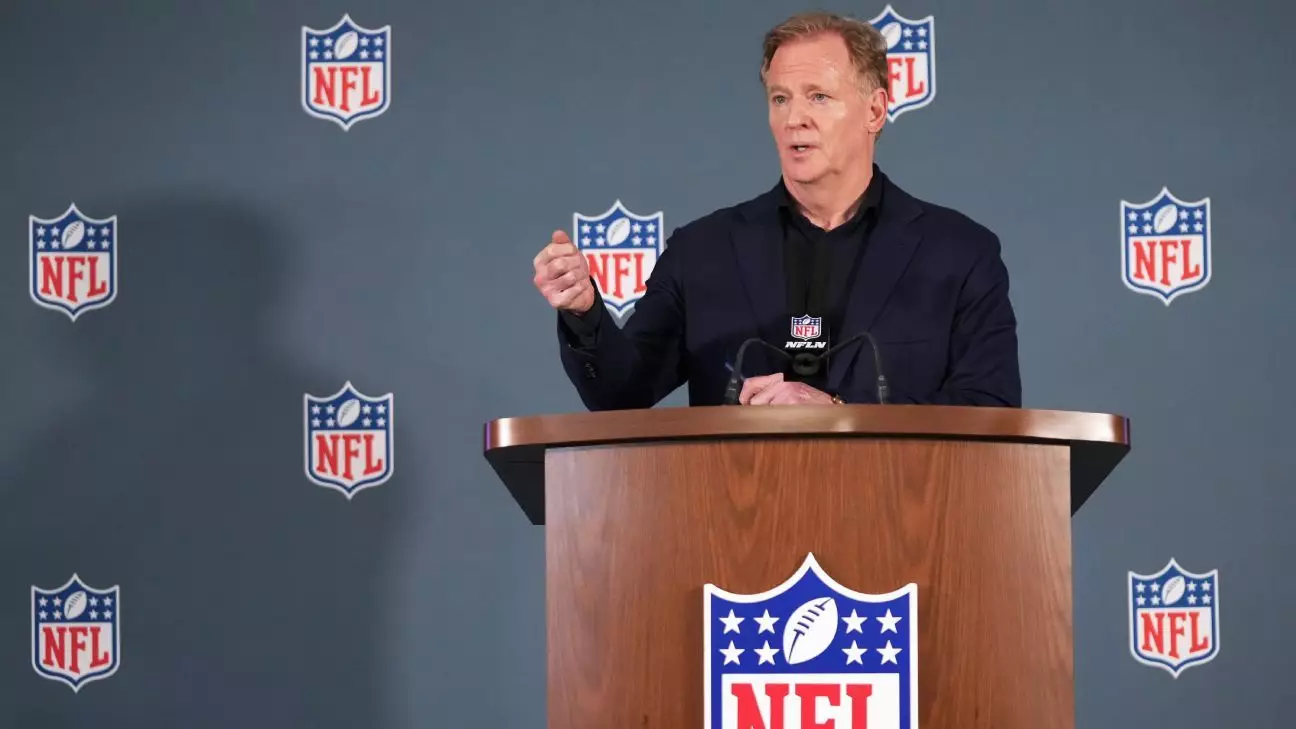As discussions surrounding the integration of flag football into the Olympics continue to gain momentum, it’s impossible to ignore the enthusiasm that players in the National Football League (NFL) are expressing. The prospect of representing one’s country in the 2028 Los Angeles Olympic Games has invigorated many athletes, who now see flag football not only as a sport but as a unique platform for international representation. NFL Commissioner Roger Goodell recently articulated this growing sentiment, mentioning the numerous players who have voiced their desire to take part in this evolution of their sport, either under the American flag or that of their native countries.
While the personal aspirations of players are commendable, the league is also heavily investing in flag football as a strategic initiative. By supporting its inclusion in the Olympics, the NFL aims to broaden the scope of American football on the global stage. This move aligns with the league’s broader goal of promoting the sport internationally. However, it’s crucial to recognize that this enthusiasm may not be fully uncomplicated. The inclusion of flag football in 2028 is not just a matter of encouraging players to participate; it also brings forth a range of logistical challenges and responsibilities for the NFL.
Navigating Challenges Ahead
Despite the palpable excitement, several concerns loom large over the implementation of flag football at the Olympic level. The NFL faces significant issues regarding player safety, especially in relation to the injuries that can arise even in a non-contact format like flag football. Establishing adequate protection for players during this international event should be a priority, given that their primary commitments lie with the NFL. The Olympics, set to unfold from July 14 to 30, 2028, may clash directly with the beginning of NFL training camps, raising questions regarding the availability and well-being of those who may wish to participate.
Commissioner Goodell emphasized the league’s commitment to addressing these challenges with both the teams and the players’ union. The upcoming discussions are framed as collaborative efforts to ensure that the 2028 Olympic participation not only meets the players‘ ambitions but also safeguards their professional responsibilities. The expectation is that, within the next couple of months, clear resolutions will arise regarding these intricate details—an essential step in validating the players’ zeal for Olympic participation.
Diversity and Inclusion: A Parallel Challenge
While flag football is a burgeoning topic within the NFL, the league must also grapple with an ongoing internal issue—diversity. As Goodell navigates the complexities of both flag football’s entry into Olympic competition and the league’s diversity efforts, he faced scrutiny over the lack of Black offensive coordinators in the NFL. Diversity, equity, and inclusion remain pivotal themes within the league; however, they are often met with skepticism, given the evidence that suggests progress is lacking in some areas.
Goodell’s commitment to these values has been frequently reaffirmed, even as various stakeholders express dissent regarding the pace of change. The NFL’s Rooney Rule, which mandates that teams interview underrepresented candidates for key positions, has been a focus of debate, especially as figures like Dallas Cowboys owner Jerry Jones express their support for its premise. Nevertheless, achieving substantial diversity is a nuanced challenge, with limited opportunities available amidst a competitive landscape that continues to evolve.
Furthermore, the NFL faces the task of making substantial advancements beyond mere policy. If diversity is indeed a cornerstone of the league’s identity, then enacting genuine changes that elevate and empower diverse candidates has to be non-negotiable. Utilizing initiatives like flag football might allow the league to simultaneously highlight inclusion while broadening the appeal of American football globally.
Looking Ahead
As we gaze into the future, the implementation of flag football at the Olympics presents a defining moment for the NFL. It represents not just an athletic venture, but a cultural one, redefining how the sport is perceived and celebrated outside of the United States. As Goodell and league officials strategize on synergies between Olympic ambitions and diversity efforts, the potential impact cannot be overstated. The juxtaposition of a global embrace of flag football alongside a focused push for inclusivity within the league sets the stage for a transformative era in American sports. Whether the NFL can successfully merge these two vital initiatives remains to be seen but offers intriguing possibilities for both athletes and fans worldwide.


Napsat komentář